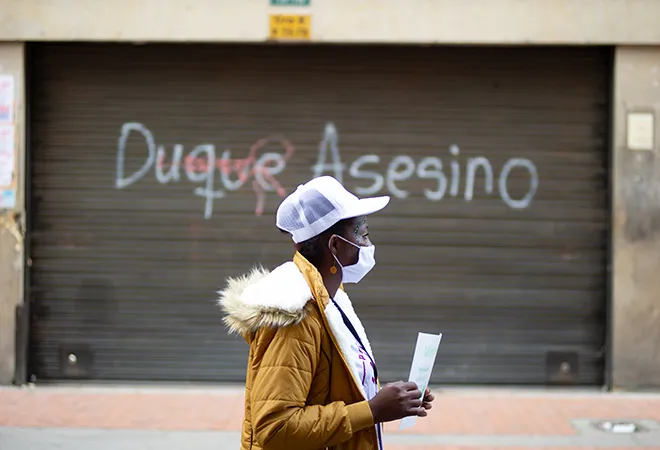-
CENTRES
Progammes & Centres
Location
Latin America will face a much greater challenge — it will have to reconfigure its political sector.

This article is part of the series — What to Expect from International Relations in 2021.
After some years of relative calm in the political, economic and social environments of the Latin American countries in the transition from the 20th to the 21st century, the region began seeing its geopolitical situation worsening in more recent years. The crisis of COVID-19 in 2020, in this sense, potentialised a series of critical issues that were ongoing in the region. In this sense, the title of this text could easily be: “Will Latin America be able to set its house in order again?”
From a political perspective, the region is undergoing a process of extreme radicalisation, causing unnecessary instability and awakening traumas from past periods of authoritarian regimes. Countries like Peru and Bolivia face the challenge of consolidating the representation of the executive branch. Peru saw four presidents in the last four years; Bolivia had a deposed president, a transitional government from the opposition, and a new elected one from the same party as the deposed one — all in less than one year. Brazil has embarked on a right-wing populist government nostalgic of its dictatorial past, rendering it unable to dialogue with the traditional plurality of political actors. Mexico, for its part, is also on a populist adventure, supposedly of the left. Venezuela continues its uncertain trajectory of political self-strangulation with a regime that does not show any signs of willingness for dialogue.
From a political perspective, the region is undergoing a process of extreme radicalisation, causing unnecessary instability and awakening traumas from past periods of authoritarian regimes.
From an economic point of view, countries that were already in serious crisis, such as Argentina and Peru, are now lost in a complex maze. In the first quarter of 2020, before the effects of the pandemic, GDP was already negative in 20 countries in the region and growth was minimal in the last 5 years. The pandemic has made the region’s GDP the worst in 120 years. Unemployment rose exponentially, accentuating social inequality in the region already known to be the most unequal on the planet. According to ECLAC (Economic Commission for Latin America and the Caribbean), “the continent is on track to lose in a year, a decade in economic terms and almost a decade and a half in social terms.”
From the point of view of international relations, the region seems to have distanced itself from multilateral models of negotiations. UNASUR (The Union of South American Nations), for example, has been completely disbanded due to the inaction of its members and MERCOSUR (The Southern Common Market) is experiencing a serious existential crisis. This further undermines countries’ ability to address common challenges and to find shared solutions.
Among these common challenges, in addition to economic problems, are two other issues on the agenda for the region: Trans-national Organised Crime and Environmental issues.
The region seems to have distanced itself from multilateral models of negotiations.
Drug trafficking, in particular, has reached mega business proportions and illegally moves more capital than the GDP of some countries in the region. The mechanisms of these criminal organisations have become more complex, involving the trafficking of arms and people, corruption, and other illicit acts. If the Colombian Peace Process has helped to resolve conflicts in the region, other forms of violence are proving to take root and are causing instability and risking regional security.
Environmental issues, on the other hand, have entered the global agenda and have had a major impact on countries that, despite having immense natural reserves, have neglected environmental conservation and a truly sustainable economy. The past few years have been marked by fires in the Amazon region and political clashes over this issue, often extrapolating the rationality expected when addressing issues such as this.
Finally, in addition to finding an effective response to the COVID-19 crisis, Latin America will face a much greater challenge. It will have to reconfigure its political sector; it must find effective paths towards a minimum economic recovery that guarantees at least the way out of the current crisis; and mainly it should seek to (re)-build multilateral channels between its countries in order to be able to set its house in order again.
The views expressed above belong to the author(s). ORF research and analyses now available on Telegram! Click here to access our curated content — blogs, longforms and interviews.